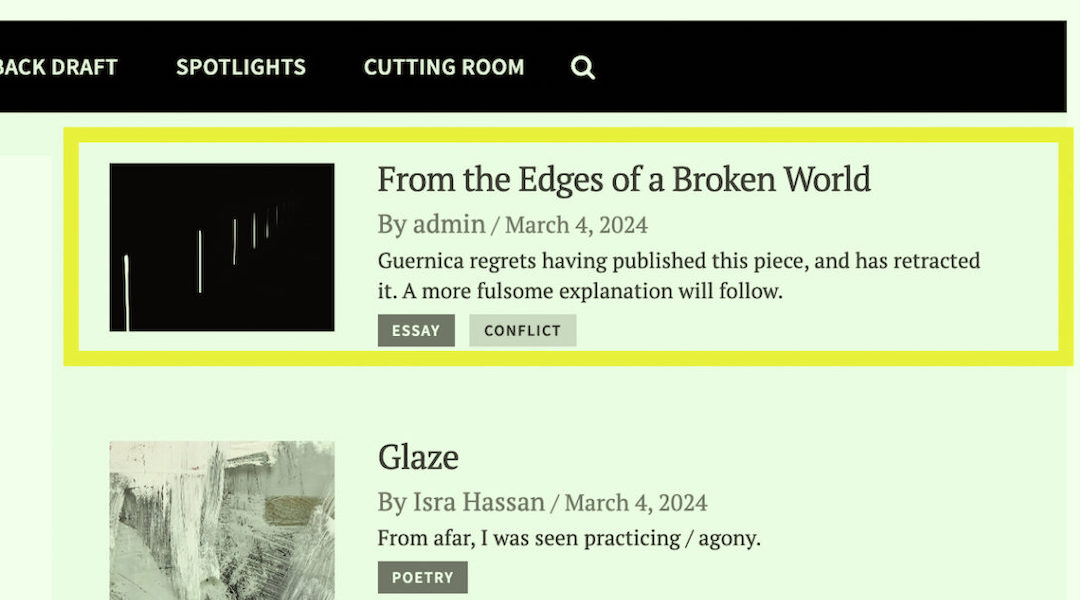Washington Monthly publishes Israeli writer’s coexistence piece retracted by literary journal Guernica
Joanna Chen’s “From the Edges of a Broken World” touched off a larger debate over whether Israelis have a place in progressive circles

The website of Guernica, a literary magazine, announces that an essay by Israeli translator Joanna Chen had been retracted. (Screenshot)
(JTA) — Washington Monthly, a center-left magazine, has published an essay by an Israeli writer and translator that was retracted last week from the progressive literary journal Guernica after that magazine’s editors and co-publisher accused it of being an “apologia for Zionism.”
Joanna Chen’s “From the Edges of a Broken World” went up on the Monthly’s website Monday, with a note from the magazine’s editors endorsing the piece and criticizing Guernica’s decision to pull it.
“We emphatically disagreed with the critique and the decision to retract the piece,” the editors wrote. “We found it to be moving and empathetic in the extreme to Gazans and Israelis alike.” An original header illustration of thin white lines against a black background had been replaced by an author photo of Chen.
Chen’s piece has touched off a broader debate about whether progressive literary circles can tolerate discussions of the Israel-Hamas war that acknowledge pain and suffering on the Israeli side. In the essay, the author — a translator of Hebrew and Arabic poetry whose family moved from the United Kingdom to Israel when she was a teenager — criticizes Israel, says she did not serve in the Israel Defense Forces and describes her experience volunteering with groups that provide medical aid to Palestinians. Chen briefly paused her coexistence advocacy after the Oct. 7 Hamas attacks, before eventually restarting it.
“It is not easy to tread the line of empathy, to feel passion for both sides,” Chen writes in the piece, which also includes translated excerpts from Hebrew- and Arabic-language poems.
Guernica initially published the piece earlier this month, before pulling it days later after intense pushback from many on its all-volunteer editorial staff. At least 15 staffers resigned from the magazine over the piece, with some — including former co-publisher Madhury Sastri, who called Chen’s piece “a hand-wringing apologia for Zionism” — posting messages on social media attacking the decision to publish the essay.
In place of the essay on its website, Guernica posted a brief statement reading, “Guernica regrets having published this piece, and has retracted it. A more fulsome explanation will follow.” The magazine has yet to elaborate on its statement.
While some in the literary world applauded Guernica’s decision, others have taken the publication to task. The Jewish progressive New York Times columnist Michelle Goldberg called the retraction “a cowardly move” and wrote, “On parts of the left, at this fanatically Manichaean moment, Jews, especially Israeli Jews, are allowed their humanity only if they’re willing to explicitly reject the collective.”
Novelist and essayist Phil Klay, whose writing often focuses on war, also criticized the decision in The Atlantic, calling it “an act of cowardice and a betrayal of a writer whose work the magazine shepherded to publication.”
He added, “It’s a betrayal of the task of literature, which cannot end wars but can help us see why people wage them, oppose them, or become complicit in them.”
In The Nation, a magazine that consistently publishes articles critical of Israel, Sasha Abramsky called Chen’s piece “brave and lyrical” and wrote that Guernica’s decision to retract it left “no space for historical nuance or complexity.”
Chen’s essay may have found a more comfortable home at the Washington Monthly, nonprofit policy magazine that maintains progressive bona fides but is not quite as far to the left or as anti-establishment as Guernica. Founded in 1969, the magazine typically backs liberal social reforms, writing in its masthead, “Instead of cynically tearing down institutions and programs, we offer innovative solutions.”
Since Oct. 7, the Monthly has published pieces praising efforts to gather evidence that Hamas terrorists committed sexual violence on Oct. 7 and criticizing Israeli Prime Minister Benjamin Netanyahu and Israel’s West Bank settlements while also going after figures on the left who praised Hamas’ attacks.
This article originally appeared on JTA.org.
















